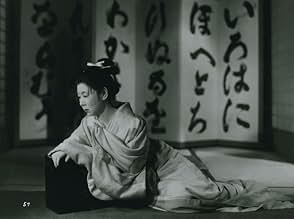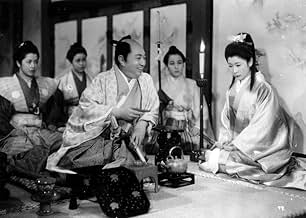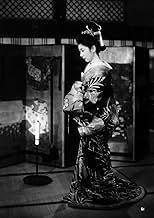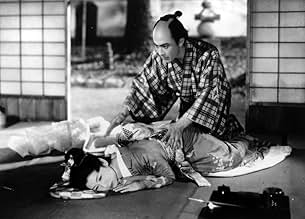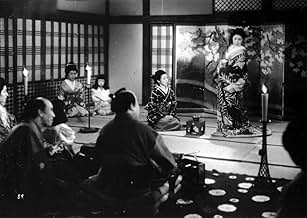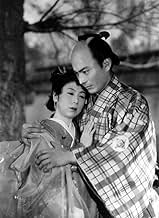IMDb RATING
8.1/10
8.3K
YOUR RATING
Follows a woman's fight and survival amid the vicissitudes of life and the cruelty of society.Follows a woman's fight and survival amid the vicissitudes of life and the cruelty of society.Follows a woman's fight and survival amid the vicissitudes of life and the cruelty of society.
- Director
- Writers
- Stars
- Awards
- 2 wins & 1 nomination total
- Director
- Writers
- All cast & crew
- Production, box office & more at IMDbPro
8.18.2K
1
2
3
4
5
6
7
8
9
10
Featured reviews
magical camera-work and immaculate direction
Deeply tragic and sad tale that is nevertheless presented to us with great dignity and style. A tale of the harshness of feudal Japan and the way the men treat the women is unfortunately not without its echo, even today in that great country. A woman here, originally of noble beginnings, makes bad, then good, then more and more bad and none of it of her making. She is simply the result in men's dealings and hypocrisies. Still beautiful to look at though with the magical camera-work and immaculate direction. Some slight confusions at first until we realise that time jumps at the blink of an eye and before we know it one period has slid effortlessly into another, where inevitably another tragedy awaits our fallen heroine.
Why Did I Wait To See This?
I finally saw Life of Oharu at the Ontario Cinematheque in Toronto last night and what an amazing film it was.
I don't know why I held out on Mizoguchi for so long. I think it's because I watched a lot of Ozu in the day and expected more of the same heavily restrained, obliquely symbolic style which is often as alienating as it is inventive. I couldn't have been further off the mark. Mizoguchi's style is fluid and assured like Hitchcock and Bresson. He also injects a warmth of spirit and shows a genuine interest in storytelling which is often absent in much of Ozu's ouevre.
The Story of Oharu is a treatise on how women are economically exploited in a patriarchal society. This is probably one of the greatest 'women's films' ever made. It ranks above 'Breaking The Waves' and Sirk's 'Imitation of Life'. No small feat!! If you like stories that actually say something about the world in which we live, I would strongly recommend this film. It's a masterpiece of world cinema. I am definitely going to see more Mizoguchi.
I don't know why I held out on Mizoguchi for so long. I think it's because I watched a lot of Ozu in the day and expected more of the same heavily restrained, obliquely symbolic style which is often as alienating as it is inventive. I couldn't have been further off the mark. Mizoguchi's style is fluid and assured like Hitchcock and Bresson. He also injects a warmth of spirit and shows a genuine interest in storytelling which is often absent in much of Ozu's ouevre.
The Story of Oharu is a treatise on how women are economically exploited in a patriarchal society. This is probably one of the greatest 'women's films' ever made. It ranks above 'Breaking The Waves' and Sirk's 'Imitation of Life'. No small feat!! If you like stories that actually say something about the world in which we live, I would strongly recommend this film. It's a masterpiece of world cinema. I am definitely going to see more Mizoguchi.
Gentle consciousness-raiser
Mizoguchi's films are capable, I think, of teaching life lessons without preaching or grandstanding. This film could cause a male chauvinist to join a consciousness-raising make sensitivity group. In a simple,understated way, the film outlines the tyrannies that made happiness almost impossible for women, not only in feudal Japan, but all over the world. It comments on the use of women's bodies as sex objects and baby-making machines, with no regard for women's minds or feelings. Notice, by the way, that Oharu (Kinuyo Tanaka)is supposed to age from 18 to 50-and she really seems to age although makeup in the 1950s was not as advanced an art as it is now. The aging process is achieved through Tanaka's acting. And if she does not seem to us to be quite the ravaged old "witch" that one of her customers claims she is, then so much the better to let us know that she is being judged by an insensitive society.
10rbiko-1
a masterpiece
I cannot agree with the reviewer who commented that Mizoguchi does not have the aesthetic sensibility of Kurosawa or Ozu. In fact, he appears to me to be the true master of Japanese cinema. 'Oharu' is a marvellous achievement - a compassionate, beautiful account of a quite astonishing fall from privilege and grace into destitution and despair. It is unremittingly bleak and yet due to Mizoguchi's genius and Kinuyo Tanaka's luminous portrayal of the unlucky Oharu, it is a spiritually compelling work, with sheer artistry and simple human empathy competing for our attention in every take. Breathtaking film-making of the highest quality.
A poor woman
It was sickening to witness how Ohara was treated by the noble men of high rank and even by her father. She is a strong and proud woman, but she has a series of misfortunes of things she could not very well control herself. Because of her looks, her pride and her birth she is put, mostly by force, into various agreements that are disgrading and she meets little compassion.
That said, as this is based on a novel by Iharu Saikaku, it has strong tendencies towards being epic in approach. This is not a bad thing, but it takes on being a fairytale almost instead of gaining credibility like say 'Donzoko' by Kurosawa. For emotional impact Mizoguchi is an absolute master however and this tragic tale could not be outdone by any other.
That said, as this is based on a novel by Iharu Saikaku, it has strong tendencies towards being epic in approach. This is not a bad thing, but it takes on being a fairytale almost instead of gaining credibility like say 'Donzoko' by Kurosawa. For emotional impact Mizoguchi is an absolute master however and this tragic tale could not be outdone by any other.
Did you know
- TriviaThis film, which was director Kenji Mizoguchi's dream project, was severely under-financed, and the production was forced to use a warehouse instead of a regular sound stage. This warehouse happened to be located near railways, and each time a train passed by, they had to stop shooting, which made the shooting of the film even more difficult with the director's obsessive use of long, continuous, uninterrupted takes. The same warehouse was also used for Josef von Sternberg's film Anatahan (1953).
- Quotes
Katsunosuke: Lady Oharu, a human being - no, a woman - can only be happy if she marries for love. Rank and money don't mean happiness.
- Crazy creditsOpening credits shown over Japanese artwork/water-colors.
- ConnectionsFeatured in See Here My Love (1978)
- How long is The Life of Oharu?Powered by Alexa
Details
Box office
- Gross worldwide
- $6,921
- Runtime
- 2h 13m(133 min)
- Color
- Sound mix
- Aspect ratio
- 1.37 : 1
Contribute to this page
Suggest an edit or add missing content


